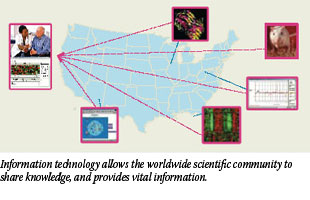|
 One of NCI's basic strategies in the campaign against cancer is to gather the best information about the disease and share it with researchers everywhere. This strategy was codified in the NCA, in which the NCI Director was charged with collecting, analyzing, and disseminating all data useful in the prevention, diagnosis, and treatment of cancer to researchers worldwide.
One of NCI's basic strategies in the campaign against cancer is to gather the best information about the disease and share it with researchers everywhere. This strategy was codified in the NCA, in which the NCI Director was charged with collecting, analyzing, and disseminating all data useful in the prevention, diagnosis, and treatment of cancer to researchers worldwide.
In the decades since the NCA was signed into law, additional legislation, such as the Public Health Service Act of 1996, broadened the scope of NCI's information sharing activities to include information for health professionals, patients and their families, and the public at large.
Today, NCI and its partners manage resources such as the Cancer Information Service, which offers confidential answers to specific questions about cancer. Information specialists respond to questions over the telephone, by e-mail, and via the Internet (LiveHelp at http://www.cancer.gov).
Another resource is the SEER (Surveillance, Epidemiology, and End Results) database of cancer statistics, which contains the latest figures on cancer incidence and mortality in the United States. These statistics are the basis for many studies reported in the news, such as the Annual Report to the Nation on the Status of Cancer.
The public can view SEER data online as part of interactive maps and graphs that show geographic patterns and time trends in cancer mortality in the United States.
NCI's oldest and main source of cancer information is the comprehensive Physician Data Query (PDQ) database. Information in this database, which is accessible online, provides physicians and the public with information summaries on cancer treatment, supportive care, screening, prevention, genetics, and complementary and alternative medicine, as well as an international registry of cancer clinical trials and many other features. Available through Cancer.gov and the Web sites of several NCI licensing partners, PDQ information also has been translated into foreign languages, including Spanish and Japanese.
An early version of PDQ was the first online database of medical information for a particular disease. In 1982, health professionals accessed it through a dial-up connection to the National Library of Medicine. PDQ first became available on the World Wide Web in 1995.
As technology has advanced, so have the tools for information sharing. Some oncologists are now using handheld computer devices to retrieve cancer information and identify open clinical trials during office visits with patients. And Cancer Control PLANET (http://cancercontrolplanet.cancer.gov) is a Web portal that provides easy access to data and research-based resources that can help state and local cancer control program planners and staff, and cancer prevention and control researchers to design, implement, and evaluate evidence-based cancer control programs.
The next frontier in cancer information sharing is an NCI initiative called caBIG™ (the cancer Biomedical Informatics Grid™). Launched in 2004, caBIG™ facilitates the sharing of data, tools, and knowledge by researchers and institutions. NCI is using this bioinformatics platform to build a network across the cancer community that supports the free exchange of information and ideas.
"caBIG™ can transform every aspect of cancer research," says NCI Deputy Director Dr. Anna Barker. "It is an information initiative for the 21st century with the potential to speed discoveries and improve the care of patients by linking researchers, physicians, and patients throughout the cancer community."
|